I write this post to present expevolu[1], a system to enable people to establish new independent countries peacefully, through the legal acquisition of territorial rights via trade.
This is the first post in a three part series introducing the idea.
This post, part I, is dedicated to explaining the basics of the system. Part II will deal mostly with a single important practical problem and its proposed solution. The third post, part III, will first discuss incentives of political agents (such as voters and politicians) in regards to the institution of the system and then provide a brief conclusion to the whole series.
The core of the system is in this first post and you can get a practical overview of it in the first sections. So, although the post is a bit lengthy, you'll be able to determine if it's something that would interest you right on the beginning, with only a small amount of effort.
Additionally, I've put some "checkpoint" marks on spots in the text that I thought would make for good places to pause; in case you want to break the reading in smaller pieces.
Part I
Table of contents:
0) Tl;dr: The expevolu system in a nutshell[2]
1) Intro to Trading for Independent Land
2) The Expevolu System (Simplified Version)
Citizens' Bundle, CB
Transition: From Practice to Theory
3) Rights Consolidation in Expevolu
4) Summary
5) Why Dormant CBs
6) Foreign Founders
7) Citizens Outrage and Direct Ownership
8) CBs and Citizenships
9) CB-Citizenship Binding and the Threat of Re-anexation
10) Equality of CBs
11) Purposes of the System
The name expevolu
12) State Owned Territories and Areas with no Defined Owners
13) Independent Zones
14) Protection of Citizens
15) Problems with Adopting Countries Interfering with IZs
16) Conclusion of Part I
0) Tl;dr: The expevolu system in a nutshell
-Expevolu is a policy that grants citizens control over their territorial rights and facilitates the creation of new countries.
-It would need to be willingly adopted by the governments of existing countries to come into being. The land for new countries would be drawn from the territories of these adopting countries.
-Governments of countries that implement expevolu would grant each of their citizens a ‘Citizens’ Bundle’, CB for short, which is a title representing citizens’ territorial rights over their countries.
-To determine CBs, the area of the whole country would be divided by the number of citizens, resulting in CB plots of equal size, with the number of plots equal to the number of citizens. Each citizen then would receive one plot.
-CBs wouldn’t replace real estate properties; they would overlap with them.
-CB owners would not be allowed to rule over their CB areas. By themselves, CBs would not grant any authority over land. This measure is to protect the citizens who live on CB areas and to protect the institutions of expevolu adopting countries.
-When combined with real estate rights, however, CBs would confer the right to declare an area independent. In other words, by owning CBs and real estate rights over the same areas, country founders would be legally authorized to establish new countries in those areas.
-Citizens who sell their CBs would lose their citizenship (kind of).
-As will be explained in the text, this simple mechanism of combining CBs with real estate rights would allow country founders to acquire the territorial rights of all main territorial rights holders: the state, citizens, tenants and real estate owners. As a result, this would confer legitimacy to the new countries.
1) Intro to trading for independent land
This section introduces the idea of getting land to create a country by trading territorial rights. We start with a very simplified example, one which takes away most real-world complexities, to show the core concept.
Example 1: A King and a Founder
In this example, there is a country and two agents. One agent is the king, who initiates a program that concedes territory for new country creation. The second agent is the founder, who desires to create a new country within the king's territory. The king is literally the king of the country, also the sole inhabitant of the country, and the only person who has territorial rights on the country.
(I ask the reader to accept the rights of the king over his land. I want to make a narrow point about transference of rights. So, although the discussion of whether the king should have the rights he has over his land, or whether other people should accept them, is important and interesting, it would detract from the main points I want to make now.)
Back to the example: Let’s say the founder wants to create a country on the lower right quadrant of the king’s country, as shown in the map below.
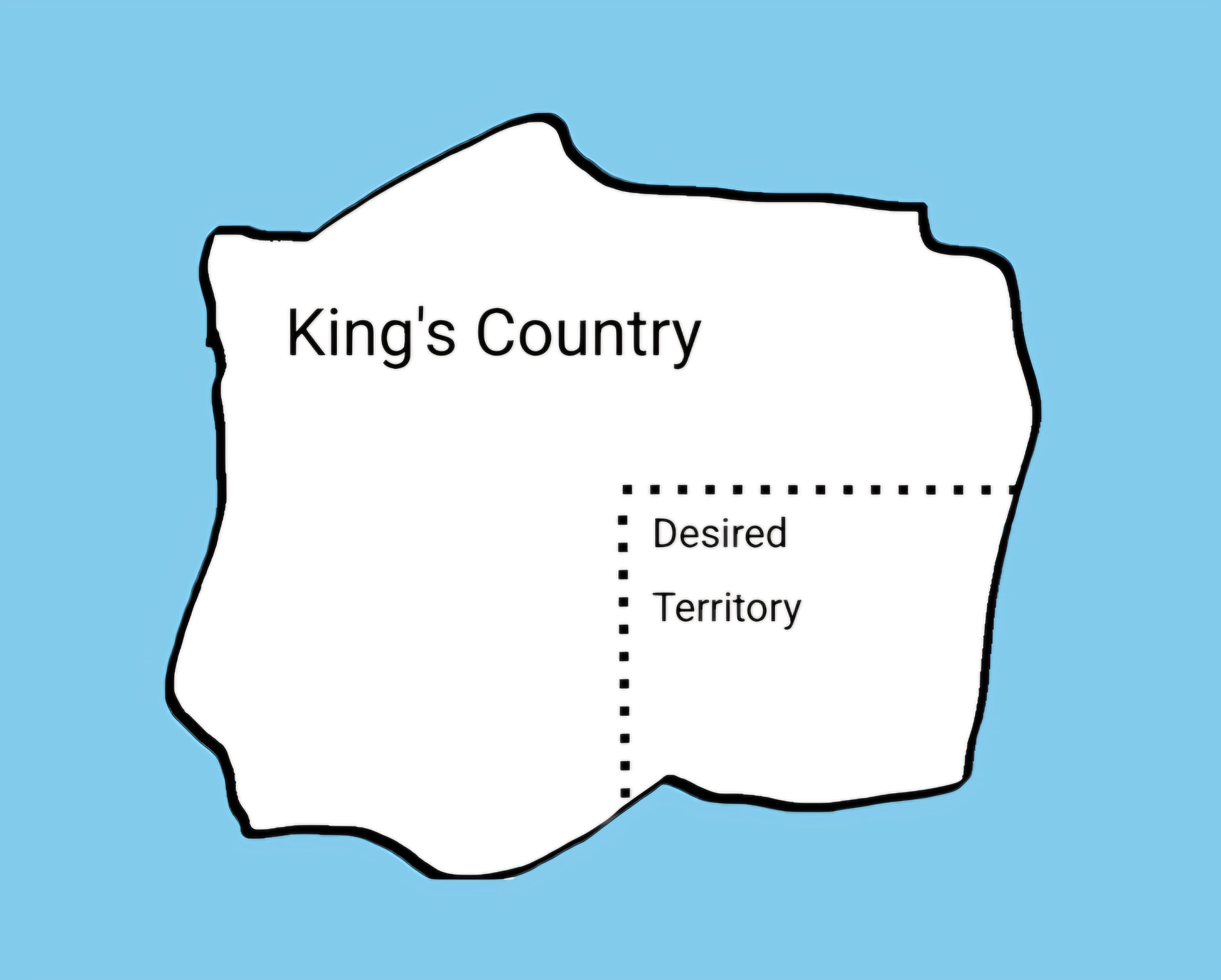
Since the king is the only person with rights over the territory in question, it’s reasonable to believe that if he agrees to transfer all his rights to the founder, the founder should have the right to create a country there. After all, if the king transferred all his rights to the founder, then the founder would have acquired the right to have a country there, because the king had that right, and the founder would not be violating anyone’s rights by establishing a country there, because the king was the only entity with rights over the territory and the founder acquired them all.
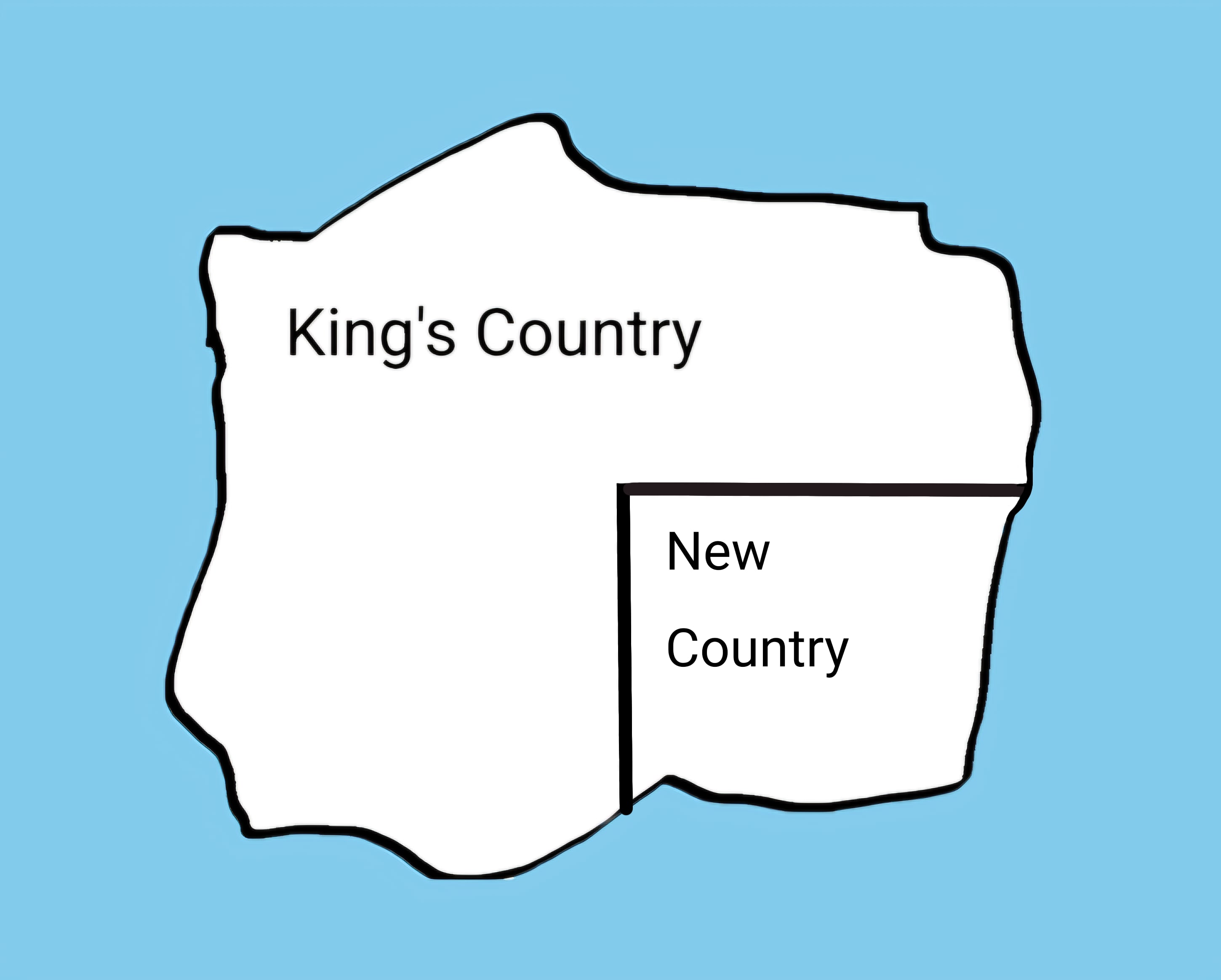
Example 2: A King, a Founder and Ten Citizens
Now let’s look at a slightly more complex example. In this example, there is one king, one founder, and ten citizens, who are also property owners. As in the previous example, the king initiates a program that allows new country creation. The king has one single property (where his palace is located), which is not for sale. The rest of the land is owned by the ten citizens, each having a plot of land as illustrated in the map below.
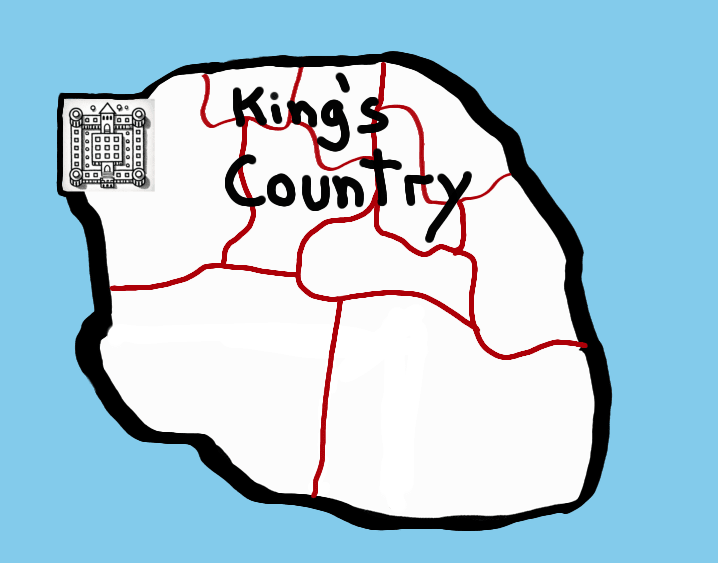
For simplicity, in this example, citizens have no rights as a result of being citizens (the territorial rights of citizens will be addressed later in the text). Since all citizens in the example own land, they will have property rights over their plots of land, but no rights beyond those.
Different layers of rights over the same areas
Since the king rules over the whole country, including the areas on which citizens have properties, there are two distinct bundles of rights that are in effect over those areas; the ruling rights of the king and the property rights of citizens. That is, over each of the properties in the country, the property owners have some rights, which we call property rights, and the king also has some rights, which I am calling ruling rights.
The founder wishes to clear land for country creation. To do that, he would have to deal both with the real estate owners of the desired land and with the king. He would have to buy the ruling rights of the desired land from the king, then buy the property rights over the area from the citizens who own them.
In the example, the desired territory is over Rosa’s property and over Mark’s property (see the maps below). The founder would have to buy the ruling rights from the king over the select region, then, buy the part of Rosa’s and Mark’s properties that fall on that same area.
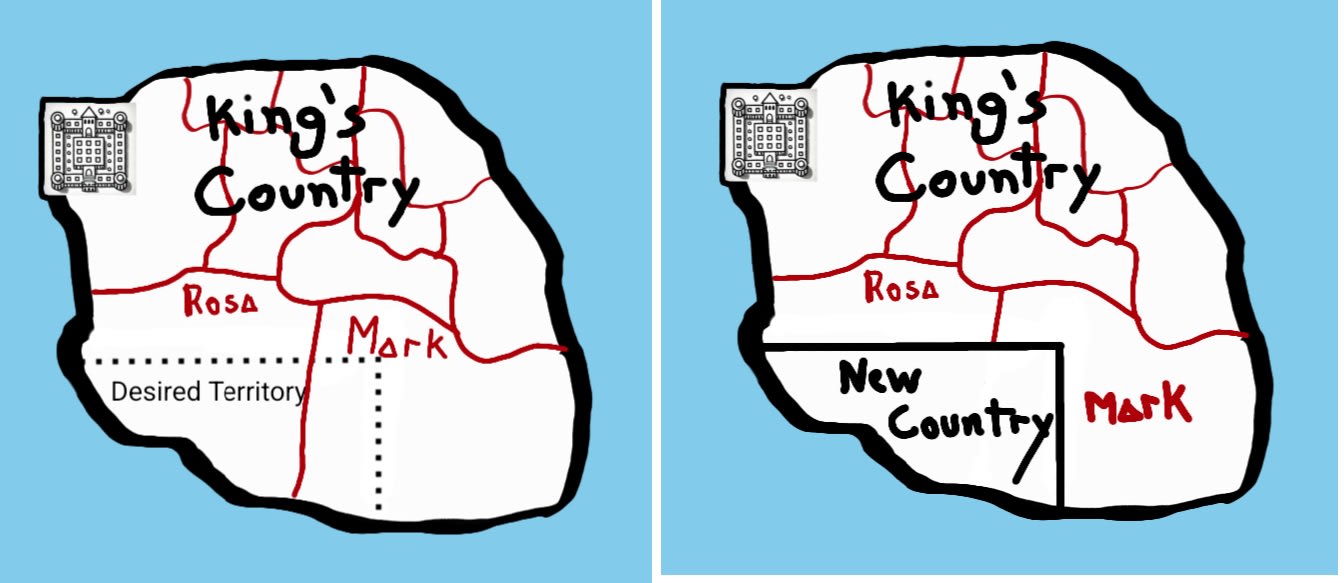
Once he has both ruling rights and property rights over the desired land, the founder would be allowed to establish his country in the region.
Dormant Rights
Rights dormancy, is a means to protect citizens from founders while allowing the rights of the state to be traded freely. Here is how the mechanism would work:
Under this system, founders would be able to buy the rights of the state before having bought the other rights in effect on the region, but they would not be allowed to use these rights over existing populations.
To have command over the areas they hold dormant rights over, they would need first to consolidate all rights over the territory. Then they would go to the relevant state agency, with the documentation, and trade those rights for a different title (an independence rights title), which would actually grant them the right to institute a country in the region.
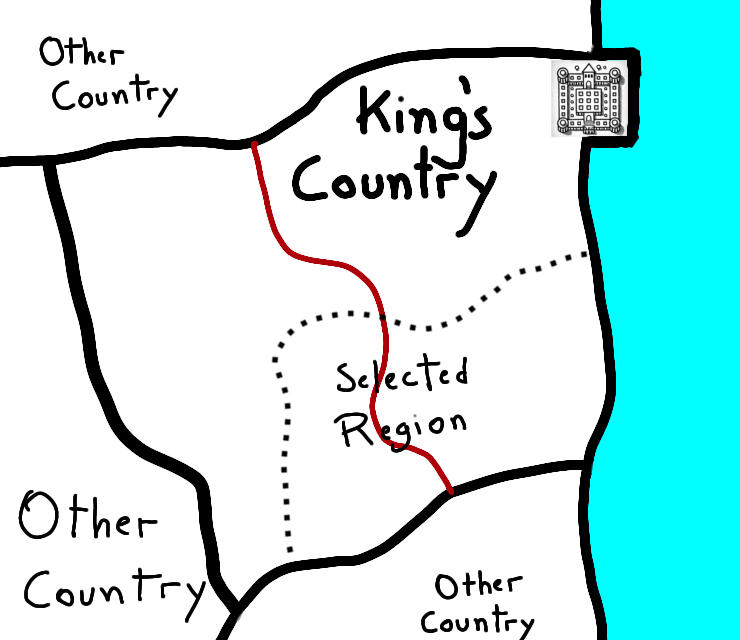
In our king and land owning citizens setting, the founder would be allowed to buy the rights of the king (the rights of the state) before buying the other necessary rights to establish his country, however, these rights bought from the king would grant him no power over the area.
Before he consolidates all rights on the region under his name, the control of the area would still be shared between the king, who would have active ruling rights over it, and the real estate owners, with property rights over it; with the founder having absolutely no command over the region.
To be granted the right to create a new country, the founder would have to buy the remaining rights over the region, the rights of the property owners. With both the ruling rights of the king and the relevant real estate rights, then he would require from the king (and be granted) the right to institute his new country.
Some important terms
The next section will introduce the expevolu system itself. However, before we get to that, I would like to make a brief nomenclature note, defining two important terms.
The first term is adopting country. Adopting countries are the countries that adopt the expevolu system. New countries emerge in the territories conceded by adopting countries.
The second term is founder. We are already using the term, however I would like to make it’s meaning, as it is particularly used in expevolu, clear. Founders are the entities that create countries in expevolu; they can be individuals or groups of people (including organizations such as companies, NGOs or even existing countries governments); groups would have to be organized into legal entities to be able to go through the legal process of independent land acquisition. [3]
2) The expevolu system (simplified version)
In this section I will describe the system and show the process of founding new countries through the system.
The version of expevolu I will describe here is a bit simplified, in part II (of this three part series of posts) the system will be complemented with some additional components that are important, but which would be distracting in this first presentation.
The idea of this section is to provide a practical overview of the system. The section, then, will be mainly descriptive; the rules of the system will be presented and the mechanism of country creation introduced, but not much attention will be paid to justifying the rules or the mechanism, this is left to the following sections.
Simplified expevolu intro
As previously stated, expevolu needs to be approved by the government of an existing country in order to be implemented.
For it to be approved in a democratic country, for instance, voters would need to find the system desirable and vote for politicians who would try to implement it. The elected politicians that favor expevolu would then need to propose its implementation and approve the proposal.
Once established, expevolu wouldn’t alter the political system or replace the existing government of it’s adopting country.
Expevolu is not meant as a means to govern or modify the governments of adopting countries. It is instead a tool to allow people to institute their preferred societal framework, whatever it is. Its application entail only minor alterations to the legal systems of adopting countries and these alterations are restricted to what is necessary to allow people to create new countries. The expevolu system is designed to be the least intrusive as possible on the political institutions of adopting countries.
The area available for independence
After the system is approved, the area available for independence would be defined. This area would be vast. It would be the whole territory of the adopting country with only a few exceptions.
One important exception is high population density regions; the territory of large and medium sized cities would not be available for independence. Areas available for independence would be mostly farmland, arid terrain and other scarcely populated territories. (There would be other excluded regions besides cities, I will comment on them as we go along.)
Citizens’ Bundle, CB
Once the area available for independence is defined, by excluding the exceptions from the country’s total territory, this area is divided by the number of citizens of the country. This division is depicted on figure 2.1 below.
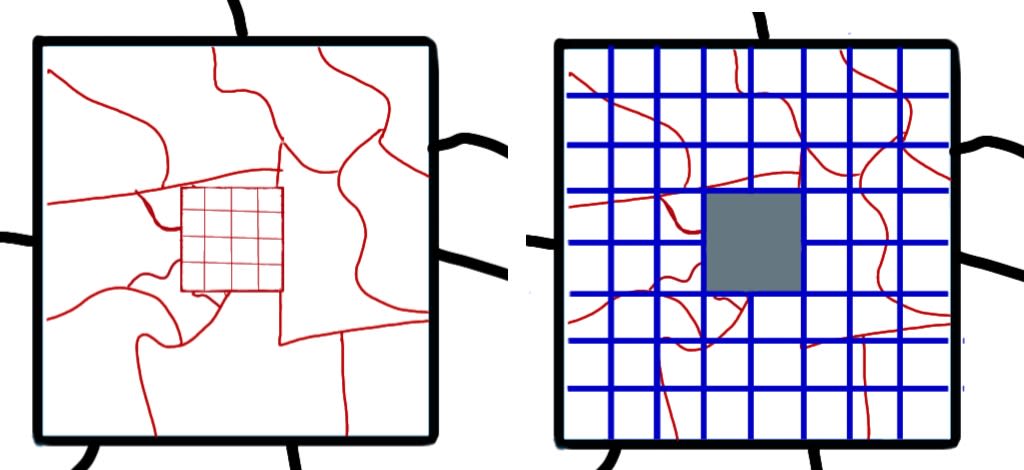
The images above show a fictitious square country that adopted expevolu; the images depict the before and after the division of the area available for independence. For simplicity, this country in addition to being unrealistically square, is also unrealistically populated, with only sixty citizens.
The map on the left shows the country before the division; the black lines are the borders of the country to other countries and the red lines represent the limits of the private properties within the country. (The area in the center represents densely populated regions.)
The image on the right is the square country after the division. There are now 60 small blue squares of equal size. The gray square in the middle represents the areas that are not available for independence. Notice that private properties were not affected by the division, they exist in addition to the blue squares that were defined by it, occupying the same spaces as them. The blue squares depict citizens’ bundles, CBs. CBs are legal titles which represent the rights of citizens over the territory of the adopting country.
CBs would be equally distributed to the population; each citizen would receive rights over a territory identical in size to those allocated to other citizens, each citizen would receive rights over exactly one of those small blue squares.
CB plus real estate = independent territory
CBs, in a sense, are very simple. Any individual who holds both all the CBs and all the real estate properties within an area would be allowed to legally found a new country on that area.
Let’s go through an example to illustrate the idea.
Example: Aussie Tibet
In the images below there are two depictions of the adopting country Square Australia. As before, the borders of the country are in black, the private properties are defined in red and the CBs borders are in blue. The gray square comprise the exceptional areas over which new countries are not allowed to be founded.
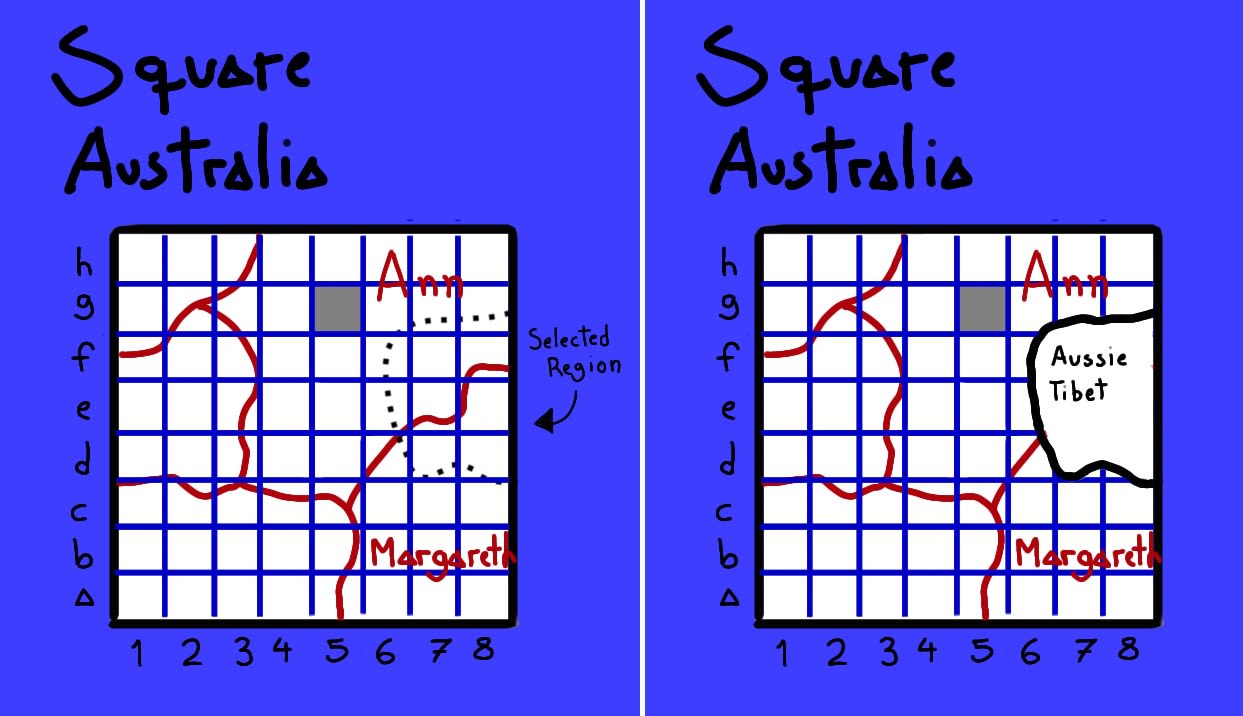
The Dalai Lama wants to found the country Aussie Tibet on Square Australia, how would he do that?
In the left image we see outlined the territory he selected for the country. To found a country there he would need to buy all the private properties that fall within the desired territory and all the CBs that fall within the territory.
The properties within the selected regions are sections of Ann’s and Margaret's properties; he would have to buy those sections. Then he would have to buy all the CBs as well; these are the entirety of the CBs that occupy f7, f8, e7 and e8, and also parts of the CBs occupying the areas g6, g7, g8, f6, e6, d6, d7, d8 and c8. [4]
Once in possession of both the property rights and the CBs over the entire selected region, he would go to the appropriate government agency and trade those for an independence rights title. Independence rights titles actually grant their holders the right to establish new independent countries. On the right image we see the map of Square Australia now with the new independent country Aussie Tibet.
If you sell your CB, you lose your citizenship
Citizens in adopting countries would have to have CBs to remain citizens. Not necessarily the whole area of CBs they received in the distribution of CBs, but at least a considerable percentage.
A more extensive explanation of the relationship between CBs and citizenship will be provided shortly. For now, it’s enough to know that the selling of CBs comes with a cost in terms of citizenship.
CBs are dormant
The area available for independence is populated with CBs. CBs however don’t disturb the areas over which they apply. They don’t grant their owners power over those areas. CBs are important as a means to acquire independence rights, but CBs are dormant. They are, in essence, just placeholders.
Checkpoint (Natural point for a break.)
Transition: From Practice to Theory
The previous section described the system without providing justification for its features (thank you for enduring that); the following sections aim to fill that gap, by explaining some of the concepts and reasoning behind the characteristics of the system.
3) Rights consolidation in expevolu
Expevolu follows the concept of rights consolidation, presented earlier, as a means to confer legitimacy to founders’ new countries and credibility to their claim over those countries.
In the rights consolidation scheme, founders are required to acquire all the rights over their desired area before being allowed to establish a country there.
However, in expevolu, founders directly buy rights only from citizens (their CBs) and real estate owners. This seems to let out two key territorial rights holders, the state and tenants.
Both, however, are implicitly considered, as we shall see.
To better understand how the four main holders of territorial rights, the state, citizens, tenants and land owners, transfer their rights to founders, let's take a closer look at the two requirements for independence in expevolu: CBs and real estate rights.
What CBs represent?
Citizens' Bundles, CBs, represent an amalgamation of all the territorial rights of citizens. These include the territorial rights of the state, because, in expevolu, the territorial rights of the state are transferred to citizens. If we include the territorial rights of the state as part of the rights of citizens, we can divide the territorial rights of citizens into two categories: citizens' territorial rights transferred from the state and other citizens' territorial rights. Let's look at each of the categories separately.
Citizens Rights Transferred from the State
In modern countries, the powers of the state tend to be justified in terms of the benefits they bring to citizens. Citizens are supposed to be the beneficiaries of state action.
Aligned with this framework, expevolu would grant citizens the territorial rights of the state (in dormant form, over the areas available for independence). Citizens would be able to use them to establish their own countries, or sell them, allowing others to do so.
The state would not partake in the transactions for territories for new countries in expevolu. The territorial rights of the state would be included in the CBs granted to citizens, and founders would buy the territorial rights of the state from citizens.
Other Territorial Rights of Citizens
Citizens also have some territorial rights that, at least to some extent, are dissociated from the rights of the state. These are rights such as the right to live in their country, the right to work there and the right to own property there. These rights change from country to country, may not be legally well defined in every country and may be entangled with the rights of the state, but it's important to note that they exist.
These rights represent a preferential treatment citizens have in their countries territories in relation to areas outside of that territory; if their countries lose territory to emerging new countries, then these citizens suffer a loss, because the area over which they have preferential rights is reduced.

Knowing what exact rights citizens have, in each potential adopting country, is not necessary. The important thing, for the purpose of rights consolidation, is for a mechanism to exist through which founders can acquire all these rights from citizens. In expevolu, the rights are bundled together in their totality and founders are required to buy the bundle. This guarantees they clear all the rights, whatever they are.
CBs Cover Citizens Rights and State Rights
By buying the CBs of a given area, then, founders acquire all rights from both the state and citizens over the area.
Tenants' Rights
In order to establish a country a great number of properties need to be acquired, certainly many of those would be tied to lease contracts.
It would be excessively costly to have founders wait until all these lease contracts expire until they are allowed to establish their countries. Fortunately, there are common practices to deal with the issue.
Tenants could specify, for instance, in their contracts with landlords, compensations, for the eventual case in which they are asked to leave before the end of the accorded lease period.
In such cases, then, property owners would pay the accorded compensation to tenants and terminate the lease agreement before transferring the rights over their land to founders. Founders would buy the properties already free of tenant obligations.
Although founders would not purchase tenants’ rights directly, they would indirectly pay for these rights, as landlords would factor tenant compensation into the price of their properties.
(What was described here is just one example of a number of arrangements tenants, landowners and insurance companies can make to deal with this issue.)
Rights consolidation conclusion
The requirement of ownership of all CBs and all properties over the desired areas is enough to clear all the territorial rights in effect over those areas. By fulfilling this requirement, founders in expevolu acquire the rights of all major holders of territorial rights: citizens, tenants, real estate owners and the state, successfully consolidating, under their name, the territorial rights that exist over their selected areas.
(Maybe it is useful to note that all this talk about rights consolidation, is conceptual, not a concrete part of the system. In practice, a founder wouldn't need to worry about the division of the CB into state rights and other citizens rights, for instance. This division exists only as an abstraction.)
4) Summary
Here is a summary of what was discussed so far, so we can move on with a picture of the system as a whole in mind.
-Expevolu is a system to allow people to institute new countries from the territories of existing countries.
-The version of expevolu presented until now is a simplified version. Although this simplified version contains the core of the system, some additional elements will be introduced in part II to deal with important problems. (Part II is the second post of a three part series).
-The expevolu system needs to be willingly adopted by the government of an existing country to be implemented. The countries which adopt the system are called adopting countries.
-The entire territory of each adopting country is made available for independence, with only a few exceptions. A notable exception is areas with high population density.
-The area available for independence, in each adopting country, is divided by the number of citizens in the country.
-The result of this division defines the citizens’ bundles, CBs, which represent the territorial rights of citizens. CBs are distributed equally and at random to the population, each citizen receiving exactly one CB.
-CBs and real estate property apply over the same territories. They co-exist on the same spaces. If you remember from our examples, CBs were the small blue squares, which overlapped with the real estate properties.
-CBs are inactive, CB owners don't have control over the land associated with their CBs.
-To establish a country, founders would have to buy the CBs and the real estate properties that overlap in the areas they selected for their countries.
-Once they have the titles of the properties and CBs, they need to trade these documents for independence rights titles. The independence rights titles are the ones which actually grant independence.
-By going through this process, founders acquire the rights of the state, citizens, tenants and land owners over their selected areas. This makes it hard to question the legitimacy of the countries they establish.
-End of summary
5) Why dormant CBs?
CBs would share the same spaces with real estate properties and the state. However, on the areas CBs apply, CB owners would have no influence over property owners’ control of their properties and no influence over the overarching rules imposed by the state on those areas.
This is a crucial characteristic of expevolu.
This means that expevolu would alter the adopting country only on the regions that actually become independent, because the regions that don’t expevolu can’t directly affect.
Let’s go through another example, to illustrate the inactive character of CBs (and also to review the process of country creation in expevolu with maps).
Example: Teslopia
Let’s say people at the company Tesla realized that it would be much easier to achieve full self-driving capability for their vehicles if, in addition to designing the vehicles, they could design the physical and regulatory environments on which their vehicles would run.
In their own country they could for instance; prohibit human drivers, create safer divides between pedestrians and vehicles and populate the environment with tailored signs to allow the machines to better orient themselves.
They decide then to create the new country of Teslopia, in the adopting country of Square Namibia, to attempt this.
Square Namibia is a country with a population of 96 people. Tesla wants to create their country in the central part of Square Namibia, in the area designated as ‘selected area’ in the map.
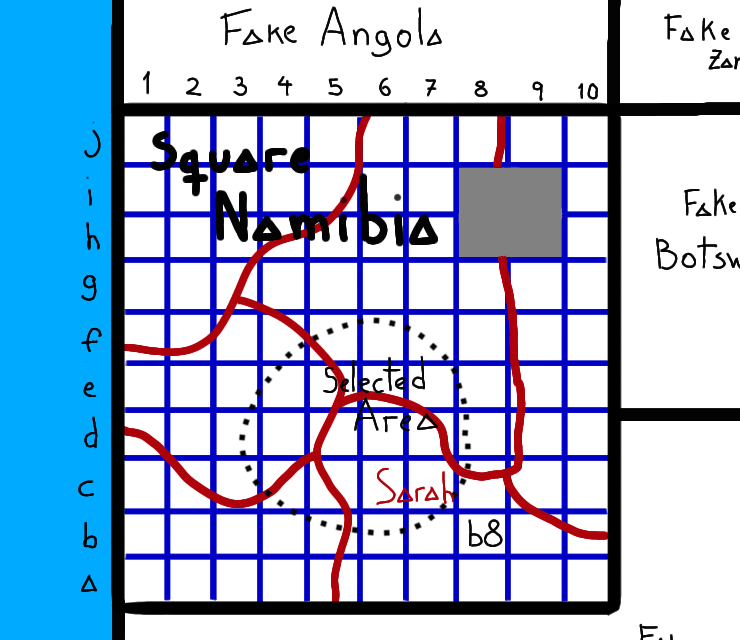
Since CBs are necessary to make a region independent, CBs fill the entire area available for independence. In quadrant b8, for instance, there is a CB, and this CB is owned by Roger. Sharing the same space with Roger, in terms of territorial rights, is the property owner Sarah, who owns the land where Roger’s CB is located, and also the state, which rules over the entire country including that bit. Roger’s CB doesn’t affect in any way Sarah’s command over her property; it also doesn’t affect the state’s rule over the region. This is true for every single CB, none of them give command over territory.
Even when a founder, such as Tesla, has both CBs and property rights over a region, the founder would still only have the command that property rights gives over the region. To get the additional command that CBs can provide, the entity would need to trade its CBs and property titles for an independence rights title.
Relevance of CBs Dormancy
Protecting Adopting Countries' citizens from forcible rule
Dormant CBs means that CB owners cannot impose their rule over unwilling subjects. CB owners who’d want to rule over a territory would have to buy the real estate property of the land and depopulate the area before being allowed to create their countries. They would only be allowed to rule over people who, after the new country is established, voluntarily opt to migrate into it. [5]
Preserving Functional Societies
Because they are dormant, CBs also serve as a tool to allow new countries to be established, while keeping adopting countries fully functional. The institutions of adopting countries would not be replaced or altered.
We tend to disparage the political systems we live under because of their many failures, but the fact is that functional societies are remarkable, improbable occurrences, which we should generally try to preserve.
Also, it is very difficult to understand society, because of its complexity, so it is hard to create successful interventions to fix problems, let alone create successful societies from scratch. A functioning society is like a human body, interventions are more likely to cause harm than good. [6]
The dormant nature of CBs would allow people to experiment with new political institutions while maintaining the functioning institutions of adopting countries, thus keeping citizens of adopting countries safe from the possible failures of emerging new countries.
Optional Adherence
Historical attempts of establishing new societal frameworks often exhibited both problems mentioned in this section: the people driving the change to the new paradigm dismantled the system available to the local population and then proceeded to impose their novel system on this population. Much unnecessary suffering came from these mistakes. Expevolu avoids them by first, prohibiting founders from imposing their rules on existing populations, and second, by allowing the institutions of adopting countries to coexist with the emerging new countries.
Adherence to the more radical changes brought about by expevolu, then, would be optional. People who’d want to create new countries, or move to them, would be able to do so, but people who’d want to keep living under the institutions of the adopting countries would also have that option.
The flow of people, land and resources
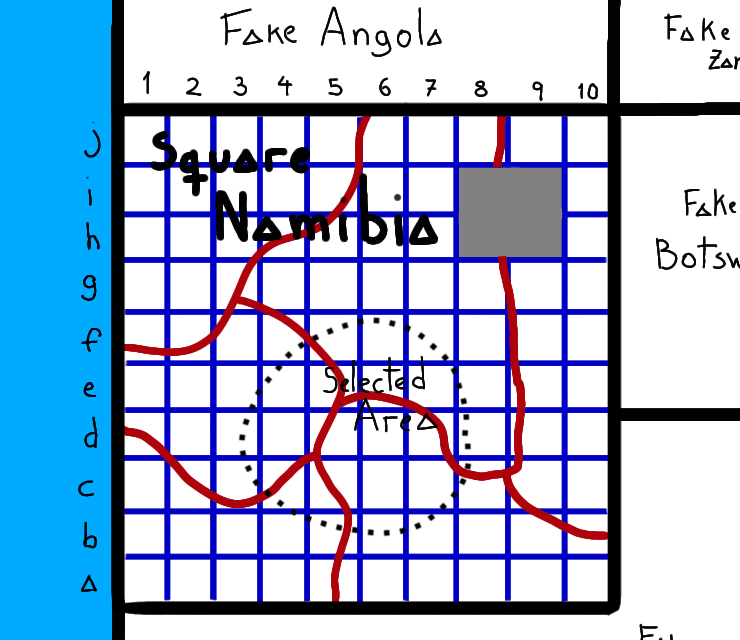
Above is the map of Square Namibia again. The entirety of the region occupied by CBs is available for independence; as previously explained, these CBs don’t give control over the land. The government of Square Namibia is still the entity providing the encompassing rules that apply over the whole territory and the land owners are still the ones with additional command over their particular properties. In principle, then, countries can be founded, such as Teslopia, without disrupting the day-to-day of adopting countries’ citizens.
However, there are indirect effects of expevolu which can alter the adopting countries in significant ways.
In expevolu, people, land and resources tend to flow to preferred countries. If an adopting country is perceived by its citizens as being of much lower quality than the countries that are emerging from it, then these citizens will migrate en masse to the new countries. In such a case, there would be a strong stream of people, resources and territory flowing from the adopting country to new countries. So, expevolu, although not altering significantly the rules under which people live in adopting countries, can significantly alter the country by offering alternatives to its population. [7]
Notice that, although flows of people, resources and territory from the adopting country to new countries may be seen (maybe from a patriot’s perspective) as the adopting country losing, they represent in fact gains in welfare to the citizens, who migrated willingly to preferable countries. Countries should only matter insofar as they affect the lives of people. [8] If reducing the territory of a country improves the lives of its citizens, then we should see that reduction as desirable.
6) Foreign Founders
You may have noticed that the Dalai Lama is not Square Australian, nor Tesla is originally from Square Namibia. In expevolu, foreign entities would be able to create countries.
There are several reasons why this is desirable.
An important one is that allowing foreign founders vastly increases the demand for CBs, and this in turn enables citizens of adopting countries to obtain much higher prices for their CBs.
This feature also increases the feasibility of the system, by increasing its desirability to voters. Since expevolu allows voters to acquire CBs, if these confer a significant benefit to them, voters would be more inclined to vote in favor of it.
Also, foreigners being allowed to found countries makes expevolu much more effective:
One of the purposes behind the system is to stimulate the discovery of better civilizational institutions. By allowing people from any country to participate in country creation, we draw from a much larger pool of ideas to improve society, making the process of discovery of the better ones more efficient.
Lastly, there is the practical matter that it is not easy to control who institutes a country. Prohibited foreign founders could, for instance, hire a local as front-man to launch the country in their stead, by-passing the regulation, and then later take over the country.
Back to the example, after registering in the adopting country, Tesla would be allowed to buy land and CBs.
The area selected by Tesla has 10 square km. So, they will have to buy the 10 square kilometers of private properties over the selected area and the 10 square kilometers of CBs that overlap the exact same area.
Tesla would then have to trade the real estate and CBs it acquired for an independence rights title. With this title in hand they would be permitted to found their country Teslopia.

Checkpoint (Natural point for a break.)
7) Citizens Outrage and Direct Ownership
Citizens’ opinions are crucial for the success of governmental policies, as strong opposition tend to significantly reduce the likelihood of their implementation.
Generally, citizens see themselves as having extensive rights over the territory of their countries. Although what exactly these rights are may not be clear to them, they believe that their countries belong to them in some undefined way. We can expect them to become very upset or even outraged, if the territory of their country is put for sale.
This outrage, however, occurs, to some extent, because citizens expect these transactions to be conducted not by themselves, but by state officials, who would neglect their rights over the territory.
It is hard to align the interests of government agents with those of citizens. If allowed to sell the territory of the country, state officials would tend to collude with prospective country creators in order to reach agreements which benefit themselves at the expense of citizens.
Removing government intermediation by granting the territorial rights of states directly to citizens prevents this type of corruption and, therefore, should reduce citizens aversion to the trading rights approach to new country formation.
8) CBs and Citizenship
In this section we analyze how the selling of ones CB would affect the citizenship status of citizens of adopting countries.
The logic behind the formation of CBs and its relationship with citizenship
Imagine a citizen wants to leave his country while retaining the value of his rights to the country. How could he do that?
There is a common method used to solve a similar problem, the one of partition of jointly owned property. Here is an example:
Example: Shared ownership and partition
Let’s say four women, Mary, Jane, Alice, and Beth, own a property together. Each of them has rights over the entirety of the property.
If one of the co-owners decides to leave the joint venture while keeping the value of her rights, she can do that. She would lose her rights over the property, with the exception of a proportionally smaller area, over which she would receive exclusive rights.
For instance, if Mary decides to leave the group arrangement but keep her share of the property, she would be granted one-fourth of the total area to hold as the sole owner. The rights of the other three owners over that portion would be relinquished.
In counterpart, she would lose her rights over the remaining area of the joint property. The three-fourths remaining of the initial area of the property would now be held exclusively by the three remaining partners.
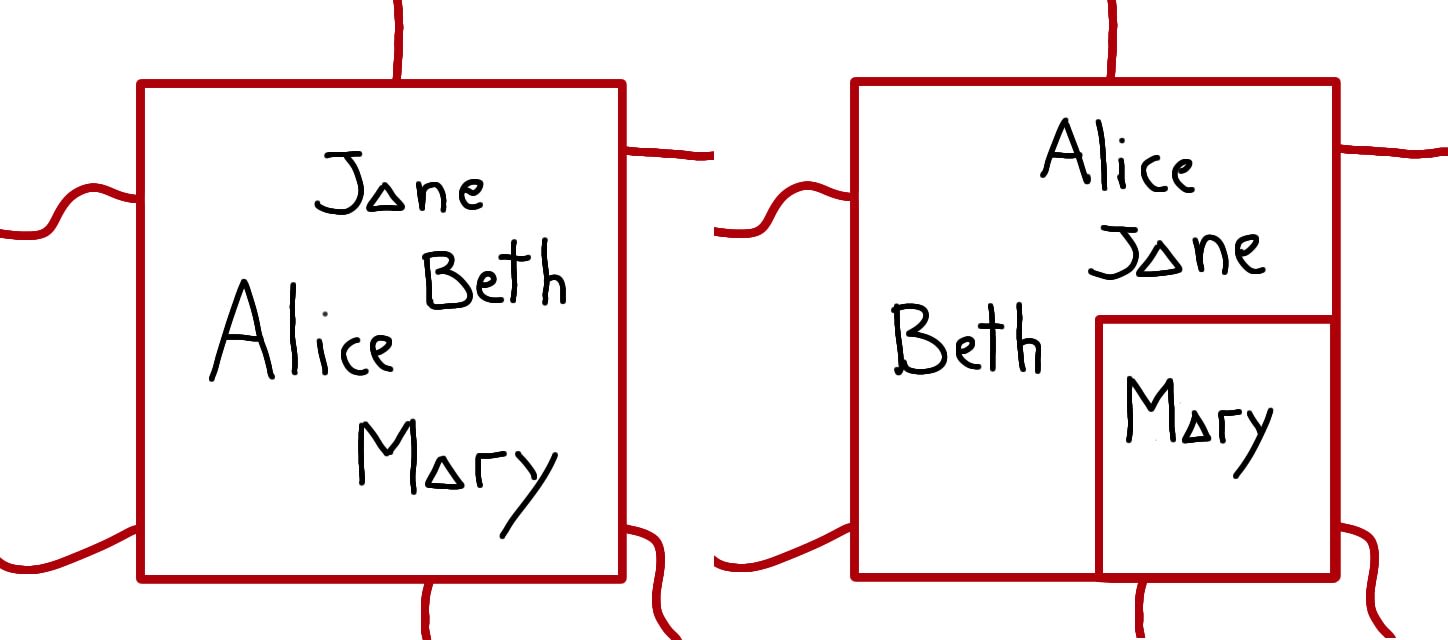
There is an equivalence, for each of the four women between the initial state, when all of them co-own the property, and the subsequent state, where Mary left with a proportional share of the property. Neither Mary nor the remaining parties seem to lose because of Mary’s departure.
End of example.
Back to our problem, if a citizen wants to leave the country while retaining the value of his rights over the territory of the country, he could do so by selling his share of the rights over that territory. In expevolu, the share of rights over the territory of the country that each citizen has is represented by the CB granted to them when expevolu is instituted.
Regarding citizenship, if the citizen sells his CB area, which represents his rights as a citizen, then, he should lose his rights over the country; which means he should lose his citizenship.
Expevolu rules regarding citizenship and CBs
As we just saw, there is an argument in favor of expevolu imposing loss of citizenship to citizens who sell their CBs. However, there are also arguments against this loss of citizenship. Additionally, CBs can be fractioned and sold in parts. Should citizens lose their citizenships if they sell any percentage of the initial area they received, or should they be able to sell some CB fraction without cost to citizenship?
There are many factors which are relevant when considering whether the system should have strict rules in this regard, rules under which citizens would lose citizenship after selling just small percentages of their initial CBs, or loose rules in this regard, rules under which citizens would be allowed to sell large percentages of their initial CB area without cost to citizenship.
After reviewing these relevant factors (which will be presented shortly), my conclusion is that the rules of expevolu should not fall on the extremes. That is, rules allowing citizens to sell all their initial CB area without losing their citizenships are bad, and rules in which citizens, in order to keep their citizenships, have to retain 100% of their initial CB area are also bad.
I suggest, then, rules in the middle ground, but first a brief nomenclature note.
Base CB: Base CB is the amount of land allocated to each citizen in the initial distribution of CBs. For instance, if the area available for independence in an adopting country has one thousand square kilometers and the country has one thousand citizens, then each citizen would receive a one square kilometer CB and that would be the base CB for citizens of that country. Base CBs are not tied to any specific location, they are the size of the initial CBs distributed to all citizens.
The rules tying CBs with citizenship:
Citizenship status would be determined by base CB.
Citizens would be able to sell half base CB without any alteration in their citizenship status. If they sell any amount beyond that, they lose their citizenship.
For example, if in the initial distribution of CBs each citizen received a one square kilometer CB, then, the citizens that want to keep their citizenship would have to always have at least half of a square kilometer in CBs.

The CBs citizens keep for citizenship don’t need to be part of the initial CBs they received; the location of the CBs doesn’t matter, only the total CB area matters. For instance, if a citizen buys a CB with an area equivalent to three base CBs and then proceeds to sell his original CB, he would not lose his citizenship, because his total CB area more than covers the requirement of half base CB.
CB ownership above the threshold of half base CB would be irrelevant for citizenship. So, if you buy an area equivalent to one thousand base CBs you wouldn’t become a super citizen (you would not be entitled to one thousand votes in the adopting country’s elections or anything like that). Also, although foreign entities, such as the Dalai Lama in our example, would be able to create countries in expevolu, foreigners would not be granted citizenship by means of buying CBs. Holding CBs would not grant them the right to live, work or vote in adopting countries, for instance.
Tentative Model
Although here I presented a definite percentage (50% of base CB) tying CBs and citizenship, this percentage is, to a certain degree, arbitrary. Maybe referendums could be used to gauge the preferences of the population in relation to this percentage. In this case, several alternatives of percentages would be offered to the population of the adopting country and whichever wins the referendum is the one instituted. [9]
Beyond the basic intuition
As mentioned earlier, there are many factors that are relevant to deciding the rule tying citizenship and CBs. Some point to stricter rules being better and others to looser ones. I present a number of these factors below.
Citizens are generally assets to other citizens
Imagine an adopting country with an area of one thousand square kilometers and an initial population of one thousand citizens.
Imagine also that, of those one thousand citizens, four hundred opted to sell all of their CB area. A new country is created in the sold area and the citizens who sold their CBs leave the adopting country.
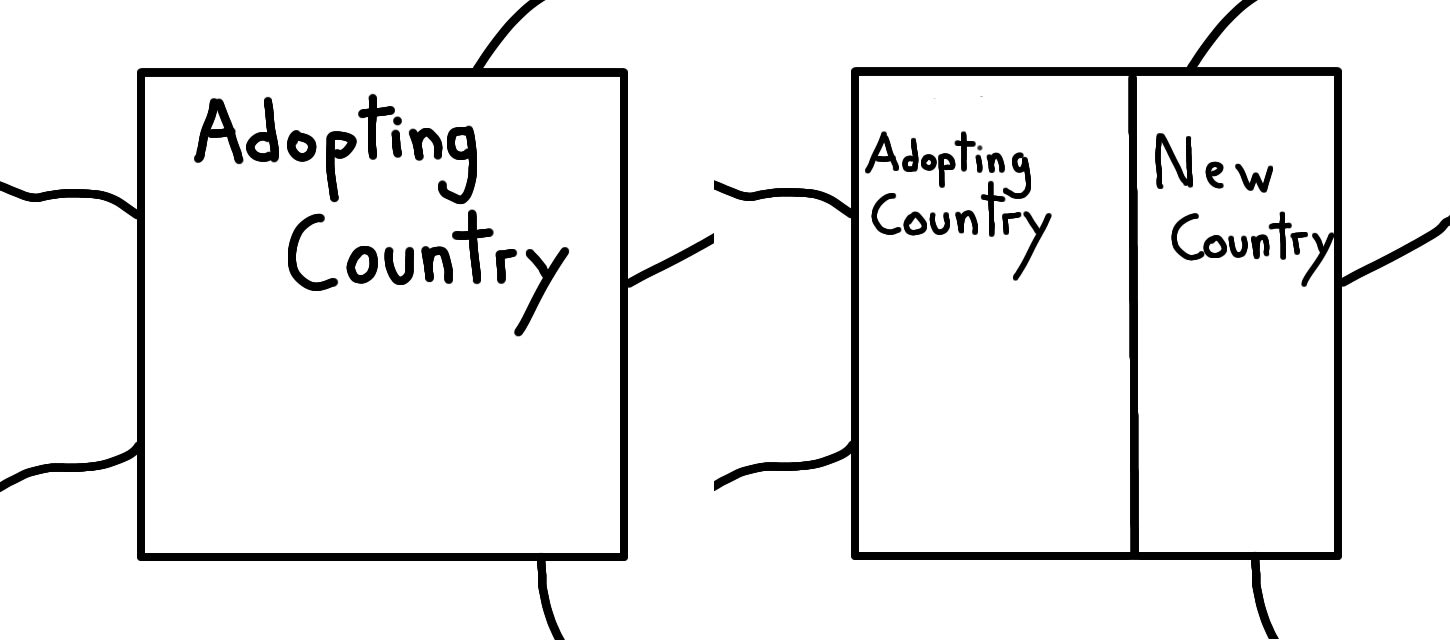
It is not clear if this moving of the people who sold their CBs is advantageous to the remaining citizens.
Generally people are beneficial to other people, that is why we tend to concentrate in cities and towns, instead of being more widely dispersed. We benefit, for instance, from the knowledge of specialized workers who live around us. If those people were to disappear this would represent a cost to us.
In regards to expevolu, this line of reasoning would support less strict punishments, in terms of citizenship status, to people who sell their CBs. That is, since forcing people to move out has this negative effect on the remaining citizens, considering this effect should make us be more favorable to rules that permit citizens to sell larger portions of their base CBs without having to lose citizenship. [10]
Citizens attachment to their countries
People tend to have emotional connections to their countries and to behave in a protective way towards it, which probably means they would tend to oppose the territorial partition imposed by expevolu on their countries.
This protective sentiment can be strong and would tend to reduce the viability of the system, because some people affected by this protective sentiment (such as citizens and politicians) are important political agents, whose support would be crucial for the implementation of the system.
From this perspective, forces counteracting the breakdown of territory would provide a benefit, because they would reduce the aversion to the system derived from the expectation of this breakdown.
CB ownership being required for citizenship would be one such counteracting force, because it would provide an incentive for citizens to keep their CBs on the common pool, reducing, thus, territorial loss. [11]
(This protective behavior is not necessarily wrong or irrational. As we discussed in the previous section, preserving the adopting country, for it to exist as an option to its population, is important.)
Trade-off considerations
Peoples lives are generally adapted to their locations. They have their native language they can speak well, their job they learned to perform, and their friends, families and acquaintances as supporting networks of people.
In this sense, from an individual perspective, it would be beneficial to be able to sell one’s CBs without having to incur in the cost of leaving the country.
However, the rules tying CBs and citizenship would apply to all, so if the rule allow for more CB selling at no citizenship cost to one citizen, everyone else would also have this right. If everyone had this right people would sell more of their CBs and the territory of the adopting country would tend to become smaller than it would under a more strict CB-citizenship legislation.
So, there is a trade-off between the benefits obtained from being able to sell one’s CBs without losing citizenship and the benefits resulting from having a larger territory available to use as a citizen. If the CB-citizenship rule is strict, people who want to keep their citizenship would not be able to benefit much from the selling of CBs, however they would have a larger territory to roam as a citizen; if, on the other hand, the CB-citizenship rule is loose, citizens would be able to benefit a lot from the selling of their CBs, but, since more new countries are being created, the territory of the adopting country available to them would be reduced.
The idea is to use the CB-citizenship tying rules which would benefit citizens the most.
To this end, is relevant to note that the most valuable and most sought after areas would not be available for independence. The city areas, where most of the people and capital is located, would be outside the areas new countries can be established in. This means that the areas that would be lost by means of giving way to new countries are areas citizens value less and use less, on average. Considering this, it seems sensible to permit citizens to sell some CB areas without having to give up citizenship.
It is also worth noting that large expanses of land may be meaningless in terms of choice, if the areas are all under the same regulatory regime. For example, if you have the choice of a chocolate ice cream cone or another chocolate ice cream cone, that choice doesn’t improve your condition. In the same way, if you live in a large but homogeneous country, you being able to move to many positionally different, but otherwise similar, locations is not much of an advantage. It would be better, then, to be able to sell large areas of CBs at no (citizenship) cost.
Also, adopting countries’ citizens may be better-off by having more new countries available to them, even at a cost of having a smaller area at their disposal. Some of the new countries might be willing to receive migrants from the adopting country. In fact, citizens of adopting countries, because of their proximity to new countries, are natural candidates to become citizens of them. It may be better for adopting countries’ citizens to give up vast expanses of homogeneous land in just one country, the adopting country, for a smaller total area of options encompassing different countries. This would provide a wider range of choices to them and possibly greater opportunities.
The problem of scarce migrating options
Currently, the migrating options available to most people are very limited. There are many barriers precluding migration, many imposed by the destination countries themselves, here are a some examples:
Legal and Bureaucratic Barriers: These include stringent immigration laws, complicated visa requirements, and quotas that limit the number of people who can legally enter a country.
Financial Barriers: Costs associated with migration, such as fees for visas and legal services, and the requirement to prove financial stability, can be prohibitive, especially for individuals from poorer backgrounds.
We can add to these migrating costs the costs outlined in the previous entry; people are adapted to their countries of origin, they know the language, the culture and have strong social networks there.
If people are content with their lives in an adopting country, but the only way they could gain from the selling of CBs is by leaving the country, they may opt to leave it, but most of the benefit of the selling of CBs may be offset by the costs of having to leave the country.
Taking this into consideration, allowing citizens to sell a portion of their initial CB area without losing citizenship seems beneficial.
Additionally, and perhaps most importantly, less strict CB-citizenship rules would facilitate the institution of new countries. These new countries, in turn, would be available to absorb the population that would want to further sell their CBs (selling beyond the point where they’d have to forgo their citizenship). This further selling would give way to yet more new countries, which could absorb more people and so on.
Unbounded CBs would be used or sold
Since CBs are dormant, CBs not associated with citizenship would provide no benefit to their holders. [12] This means that, the best strategy for every single citizen would be to use or sell all their CB areas not bounded to citizenship.
So, if citizens are allowed to sell 25% of their base CB without losing citizenship, then we can expect 25% of the area available for independence to become new countries eventually.
Conclusion
As previously stated, there are many factors relevant to the decision of the strictness of the relationship between CBs and citizenship. Some arguments favor strict rules, while others favor loose rules. Avoiding the extreme positions is a good compromise.
The topic of the next section is very relevant to the discussion of this section as well, but, I thought it merited a separate section. It's a mechanism to prevent adopting countries from re-incorporating the territories of new countries. The mechanism is based on the CB-Citizenship relationship.
Checkpoint (Natural point for a break.)
9) CB-Citizenship binding and the threat of re-annexation
The greatest military threat to new countries in expevolu would probably be the adopting countries themselves. Adopting countries could try to re-incorporate new countries into their territory; specially successful new countries which become rich.
The best protection expevolu provides to these threatened new countries is full independence; they would be allowed to have armies to defend themselves.
A second line of protection comes from the association between CBs and citizenship. CBs being entangled with citizenship creates an incentive for voters to oppose this confiscation.
The logic is the following:
1) If CBs were not required for citizenship, there would be CB-less citizens, and their numbers would tend to grow over time:
If citizens could sell their CBs at will without losing citizenship, then, over time, an increasing number of citizens would sell all their CBs. Consequently, a progressively larger proportion of the population of the adopting country would consist of individuals who have no CBs.
2) Voters who have CBs are sensitive to CB price:
For people who’d sold all their CBs, and consequently own none, a collapse in CB prices may not be much of an issue. However, for people who do own them this would be terrible.
3) If CBs are required for citizenship, all voters would have CBs:
If people are obligated to have a substantial share (such as 50%) of their base CB to retain citizenship, then every single citizen in the adopting country would have a substantial share of their base CB. Since citizenship is required for voting, this means that all voters in the country would have a large CB area and a direct interest in CB prices.
4) Attempts to confiscate new countries devalue CBs:
The price of CBs is heavily dependent on potential founders, migrants and investors believing they will not have their territory and the capital they invest in new countries confiscated. Attempts by adopting countries to re-incorporate new countries should be followed by decreases in CB prices.
5) All citizens would have an incentive to oppose attempts at new country confiscation:
Since all citizens would have CBs and confiscation would reduce CB value, all citizens would have an incentive to oppose theft of new countries. [13]
Therefore, the requirement of CBs for citizenship performs the important task of reducing the political viability of projects of confiscation of new country areas.
Long-term stability
CBs being attached to citizenship also should help maintain the long run stability of expevolu itself in adopting countries; because CBs would be valuable, but only while expevolu exists. If an adopting country government decides to end expevolu, then all CBs owned by its citizens become worthless. If CBs are tied with citizenship, all voters would be CB owners who would have a direct interest in retaining their CBs value and therefore would be reluctant to abandon the expevolu system. [14]
10) Equality of CBs
CBs are arrived at by dividing the territory available for independence by the number of citizens of the country. This generates many territories of equal size which are then distributed at random to the population, each citizen being granted exactly one CB.
This distribution is intended to be egalitarian, but some CBs, because of their privileged location, would be more valuable than others; which means that some people would receive more valuable CBs than others.
To counter this, citizens who are worried about receiving low value CBs could organize to create an insurance of CB value. Before receiving their CBs they would create a contract on which they agree that the ones who receive the more valuable CBs would transfer some of this value to the ones who receive the less valuable CBs. [15]
A second alternative to equalize CB value by citizen would be to, instead of each citizen being given one CB, for them to receive a larger quantity. So instead of, for instance, each citizen receiving a CB of 1000 square meters, they would each receive 10 scattered CBs of 100 square meters each.
The value of this diverse bundle would tend to be less extreme than the value of a CB drawn from a single location.
11) Purposes of the system
In this section, some of the objectives of the system will be presented and the name expevolu explained.
Some important benefits of the system, as well as important problems, are not present in this list. There will be future posts (outside this three post introductory series) talking about those.
Keeping the value of what is owned:
Expevolu, through CBs, grants citizens private ownership of their territorial rights. This allows them to retain the value of these rights even if they decide to leave the country.
Imagine a home owner who lives in a city, but who wants to move to a different city. Being able to sell her home before moving is very advantageous to her. If her rights to her house were tied to her living in the house, then when she moves, abandoning her house, she would be suffering a great, and seemingly unnecessary, loss.
Having the option of private ownership of their territorial rights, given by CBs, would allow citizens to move to different countries without losing the value of their rights, because they would be able to sell them.
Voluntary association:
Having CBs would also allow citizens to disband and regroup in meaningful ways.
Commonly, members of organizations join voluntarily and are free to leave if participation ceases to be beneficial to them. In contrast, citizens of a country are joined together by accident of birth and generally are stuck with that group.

It is natural that in organizations formed this arbitrarily, that there would be, among members, a large array of different opinions, goals and values. It would be hard, then, to reach agreement on matters such as what the organization should strive for or how resources should be allocated.
If people have different and opposing objectives, this could cause them to be at constant and unnecessary conflict with each other. The conflict would be a consequence of them being locked as one single group (encompassing the whole population) composed of many misaligned subgroups; the only way some subgroups could achieve their goals would be by ruining the prospects of other subgroups achieving theirs. Private ownership of CBs would allow citizens to disperse and reassemble voluntarily, so that each group is allowed to pursue its goals peacefully and effectively. [16]
A note of concern regarding freedom and voluntary associations:
People being able to associate freely is great in many ways, but is not without it’s downsides. For instance, a good man who is condemned to spend his life handcuffed to a psychopath, probably would be able to prevent a lot of harm. He would be there every time the psychopath tried to do something terrible and he would likely be successful in stopping the bad deed at least some of the times. In the same way, there likely are some people and institutions today, who would cause great harm if they are released from their entanglement with the general population and allowed to create their own countries. Expevolu, in its current format, doesn’t have good ways to prevent this from happening, so I want to draw attention to it, so that more work can be done in the area.

End of note of concern, back to possible benefits of the system.
Harm Escape:
Involuntary groupings, with no disbanding option, also leave group members at much greater risk of suffering from many kinds of harm.
Moving away is just a great defense against harm; it is effectively used throughout nature, not just by humans. If it’s too hot, you move away, too cold, you move away, if there is no food or water, you move away. The same goes for unwanted relationships with powerful entities; if you are being stolen from, hit, censored, enslaved, etc., to be able to evade these interactions is crucial. Giving people means to escape harm is a great way to promote welfare; it is a simple, yet powerful solution. [17]
The name expevolu
Exp from experiment
One of the most terrible failures of our current world is the failure to explore the space of possible governance institutions.
A country that adopts expevolu would provide a viable path for virtually anyone in the world to create a country. This would vastly increase the number of different societal arrangements attempted.
The ‘exp’ of the word expevolu comes from the word experiment.
Evo from evolution
The ‘evo’ of expevolu, comes from the word evolution. The association of expevolu with evolution comes from similarities between what would likely be the result of its adoption and the process of evolution through natural selection. If hundreds of countries with different political systems were created, some would be more successful than others. The more successful ones would be in a better position to expand in territory, would be more sought after by migrants and would have its characteristics copied by country administrators which aspire to similar success. The traits of the winning countries will tend to be selected over the ones of the failed countries.
Volu from voluntary
The ‘volu’ of expevolu comes from the word voluntary.
The word voluntary relates to expevolu in different ways. An important one is that there are currently a very large number of voluntary interactions being suppressed because people have no means to establish new countries. There are already a significant number of governance arrangements that a significant number of people find preferable to the arrangements they are currently under. And I believe the number of possible alternatives is only not much larger because people don’t believe that these alternatives will ever be available to them. If they believe their preferred system would have no chance of ever being implemented, then they will not care about knowing what would be the characteristics of this system. Similarly, entrepreneurs and thinkers, will not be motivated to design better governance systems if they believe the barriers to those systems implementation would be prohibitive. Once these barriers are removed, I expect a large number of new societal alternatives to emerge.
Expevolu would allow these presently prohibited voluntary groupings to occur.
12) State owned territories and areas with no defined owners
Until now the areas available for independence were all in privately owned land. The parcels were all over private properties. But there are areas within countries that are state owned and areas that don’t have a clear legal owner, would those be available for independence as well?
Areas with no defined legal owner
Areas with no defined legal owner should get privatized. The land should be distributed equally among the population and be included in the areas available for independence. Another possible method of distribution would be to distribute the land to the poorest people in rural areas; this may be a good idea because those are the people that would be most vulnerable in the population displacements caused by the founding of new countries.
State owned areas
Important government buildings would be excluded from the areas available for independence because these buildings are important to maintain the processes and institutions of adopting countries. (Although these areas would tend to already be excluded by virtue of being in densely populated areas.)
In addition to important government buildings, other important state owned areas, such as strategic military locations, should also be left out of the areas available to founders.
Conceptually, within the framework of expevolu, the less important state owned areas should become available for independence.
If they were to be incorporated they would be initially privatized, preferably in an egalitarian fashion (dividing the land equally among the citizens) or in a poverty alleviating way (e.g. giving the land to the 20% poorest people among the (preferentially rural) population).
Practically, however, the incorporation of these areas could be costly and time consuming. The areas may be bureaucratically entangled in a way that it would be hard to claim them for re-distribution and later use in expevolu.
The political battles for these areas could delay the institution of expevolu or prevent it from being established entirely. For relatively small bits of land, this doesn’t seem worth it, better to ignore these state owned territories and proceed without them. If the state owned land is, however, large (say, over 20% of a country’s territory), then these battles may be worth fighting.
(This 20% number is just my intuitive boundary, don’t take it very seriously. I gave very little thought to this.)
Areas with informal owners
There are areas that are not legally owned, but that are informally owned; areas where there are people who are informally recognized as owners and perceive themselves as owners, but that don’t have this recognition from the state. For these areas, the ideal would be a process of formalizing this informal ownership and then make the areas available for independence. This process may be hard to accomplish. It may be difficult to define clear owners without a large degree of arbitrariness and many disputes. So, it may be prudent to leave some of these areas out of the area available for independence in expevolu, just because it may take too long to resolve these issues. However, in principle, these areas should be given a formal owner and included in the area available for independence. [18]
Beyond these exceptions, natural reservations also seem like they shouldn’t become part of the territory open to independence. [19]
13) Independent Zones, IZs
So far I have being talking about the creation of new countries in expevolu. However, independence rights in expevolu allow their possessors to institute a large array of different societal structures, including ones that may not exactly fit the classification of country.
These could be industrial complexes, natural reserves, military bases, refugee camps, sanctuaries, etc.
It was useful to start the text using the term country instead of independent zone because the term independent zone left the degree of independence vague. I wanted to convey from the start that both the degree of independence achievable through expevolu was extremely high and that the creation of actual new countries was possible. However it is more precise to use the term independent zones rather than countries to refer to generic societal structures that emerge through the process of independence in expevolu; because those may or may not be countries.
From now on then I’ll be using the acronym IZs, for independent zones, to refer to these generic societal structures. (However I will still talk specifically about countries a lot.)
Checkpoint (Natural point for a break.)
14) Protection of Citizens
Expevolu doesn’t work well with constraints on what types of IZs (Independent Zones) founders are allowed to create. If governments of adopting countries try to impose restrictions on the forms IZs can take, many negative effects start to appear and the system becomes much less desirable. Exactly what are these effects is the topic of the next section. On this section we assume founders would be free to create any type of IZ they like and discuss how citizens can protect themselves against the possible awfulness of the IZs that emerge.
Awful countries and consent
Of the space of all possible countries, most are terrible. If country creators in expevolu are granted a lot of freedom regarding the forms their IZs could take, this means that they would have the freedom to create a lot of dreadful IZs. How would people protect themselves from economic collapses, censorship, abuse, slavery and the like?
The most important line of defense is consent. All IZs would start empty. IZ founders would not be allowed to force their ruling on existing populations, people would need to willingly migrate into the territories of IZs.
Founders would have to buy land in the adopting country before instituting their IZs. If there are people living on this land, these people would have to move somewhere else before the new country is established.
This means that in expevolu, citizens would only be under the rule of governments of IZs if they opt to move to these IZs. They have to consent to be part of the IZ.
Related to the requirement of consent, is the change in behavior that strictly consensual relationships bring about. If founders cannot force people to live under their rules and if they want to attract citizens, they would be incented to create attractive rules. This would tend to raise the quality of IZs. [20]
Migration
Another protection is migration. In an environment where there are many options of IZs, if people are dissatisfied with the IZ they migrated into, they can migrate once more to a different one. Again, this possibility drives the behavior of IZ administrators that want to attract and retain citizens to shift in ways that are beneficial to citizens. They would want to create better IZs so as to retain their citizens and to attract citizens from other IZs and normal countries.
This mechanism would tend to select attractive IZs over time. [21]
But, of course, there is the risk that some IZs, once they acquire a sizable population base, would just prohibit migration and start exploiting their citizens. This possibility should be seriously considered by someone planning to move to an IZ. They should require from the IZs leaders credible assurances that they will be allowed to move away from the IZ at anytime in the future.
Citizens would have to trust IZ administrators that they will be allowed to migrate.
It will be hard to establish this trust.
The main reason for it being hard is the expected disparity in power between the two parts. If IZ administrations control the army and the police, for instance, how could citizens expect to have their rights upheld against the interest of those administrations?
One important thing to keep in mind here is that this excess power on the side of IZs’ governments is not to their advantage if it prevents them to attract the citizens they want.
Maybe a strategy of reducing their own power in relation to their prospective citizens would be advantageous. This could allow their target citizens to feel safe enough to move in.
Prospective citizens would tend to choose IZs that are able to make them feel safe over the ones that don’t.
Below is a list of some mechanisms available to founders and prospective citizens to promote trust and facilitate cooperation.
Third-Party Arbitration: This involves resolving disputes by agreeing to abide by the decision of an impartial third party. The arbitrator's authority comes from the consent of the disputing parties. So, conscious prospective citizens would search for IZs that would use trustworthy third-party arbitrators to adjudicate their disputes with citizens.
Third Party Armed Forces and Enforcement Agencies: Third party private armies or enforcement agencies could be hired preemptively to enforce the decisions of arbitration agencies.
(It should be expected for some institutions to appear to meet the demands created by new countries. Private armies and private arbitration agencies are examples of probable ones.)
Common Knowledge Devices: Generally we feel compelled to support our allies if they are being wronged, however, we don’t feel nearly as compelled, if at all, if they are clearly the wrong ones. Devices that generate public knowledge about the obligations of each party in an agreement facilitate coordination of third parties in favor of the party in the right. The expectation of this support for the party in the right incents possible agreement violators to not violate their agreements.
Important common knowledge devices are contracts and public declarations.
Security: The use of security in transactions helps ensure compliance with agreements. If a party fails to fulfill their side of a deal, the security can be forfeited. This reduces the risk for the other party and can facilitate transactions where trust is limited.
Governments of IZs could hold valuable assets in different countries and use those as securities in contracts with their citizens. In relation to rights of exit, one possibility would be for some likely barriers to migration to be monitored and if the government try to impose those barriers on their citizens, then their assets are forfeited.
Escrow: Escrow is a financial arrangement where a third party holds and regulates the payment of funds or assets between two parties in a transaction. The escrow agent ensures that all agreement terms are met before releasing the funds or assets, providing security and reducing risk by acting as a neutral intermediary.
Democracy: As a governance system, democracy functions to balance power between the government and its citizens. Through democratic processes, such as voting, citizens are given an opportunity to influence government actions. Democracy serves as a mechanism that steers governmental decisions towards considering the desires of citizens.
Corporate ownership: IZs could also be corporations, in which citizens are share owners and, therefore, have some power within the governance structure.
Previous Reputation: Some individuals and institutions would already have a good reputation coming into expevolu. Reputable founders, the ones who are know for keeping promises, being competent, efficient, fair reliable, etc, would be in a better position to get their desired citizens to move into their countries than less reputable ones.
These were a few examples of mechanisms available to founders and prospective citizens to reduce mistrust and facilitate agreements.
Summary of the section:
Every IZ in expevolu would start devoid of citizens. Every citizen would have to deliberately opt into the IZ.
The strongest line of defense for citizens in expevolu is consent.
Consent drives the behavior of founders in the direction of producing IZs citizens would desire to live in.
However, it is very important that consent be given not just at the starting point, but in a continual basis. The possibility of migration is crucial in this regard.
Yet, some IZs may deny migration rights to their citizens; people should be mindful of that when selecting an IZ.
One of the first challenges of founders of IZs would be to gain the trust of prospective citizens. This should not be an easy task, but it shouldn’t be as difficult as one may first expect, because there are many trust building mechanisms available to founders and potential citizens.
15) Problems with adopting countries interfering with IZs
In this section I am going to point to some of the problems that emerge when adopting countries try to control the forms IZs are allowed to have. These problems are large enough as to make the expevolu system unworkable in most cases where control of IZs by adopting countries is attempted, although some small amount of regulation should be workable.
Let’s say the governments of adopting countries were to judge the merits of each individual IZ to be created and approve or deny its implementation based on this judgment. In this case there are some important problems we should consider:
Unequal treatment: the equality of allowing every type of society provides a good proxy to justice. It seems unjust to have the preferred societies of some people allowed and the ones of others denied. Of course this is not the only metric of justice that should be considered, but it's an important one.
Political conflict: if there were filters allowing some societies and prohibiting others, then there would be conflict over which type of societies should be allowed or denied and conflict over who should get to judge which gets in and which doesn’t.
Costs related to judging the legality of each IZ project: If IZs have to be approved by the government of the adopting country, then there has to be a process of evaluation of each IZ project. This process of evaluation would be costly and a heavy burden on adopting countries’ institutions.
Stifling Innovation: If adopting countries try to reduce the evaluating costs by creating standard templates which every IZ should comply with, then this would curtail innovative ideas, reducing the efficiency of the process of discovering and selecting high quality governance rules.
Bureaucracy and Red Tape: This system would create a substantial amount of bureaucratic red tape. Founders may need to navigate complicated and time-consuming processes to get their IZs approved.
Arbitrary or Discriminatory Decisions: There's a risk that the decisions made by government officials about which IZs to approve could be arbitrary or discriminatory. This could be based on personal or political considerations rather than the merits of the IZ proposal itself.
Incompetence in selecting the approval criteria: It is hard to understand how societies function. If government officials are to judge (from blueprints) which types of IZs are likely to succeed and which are likely to fail, then we should expect them to be wrong a lot.
Corruption: Then there is the problem of corruption; which would likely be massive.
A very prevalent strategy of successful politicians is to partner with interested parties in order to win elections. First the interested party finances the campaign of the politician, this financing gives and advantage to the favored politician in relation to politicians who don't engage in similar practices, after the favored politician wins the election, he or she compensates the funder by granting political favors in return.
In time, this selects for corrupt politicians, institutions and leaders, who displace their honest counterparts.
If there were filtering in expevolu of which type of society could or could not be implemented, this same mechanism would likely take over. Government officials would have the power to influence who has their project approved and who doesn't. Once having that influence they would be able to sell that influence and would likely do so, since doing so would be a winning electoral strategy. The system would select for founders and politicians willing to engage in these corrupt practices.
Monitoring and enforcement:
Beyond these there are the issues that arise from the monitoring and possible punishment of IZs for deviating from the approved projects. If the adopting country were to select projects, then its job wouldn't end at the approval of these projects; they would have to make sure that the IZs would actually follow the approved plan.
Governments of adopting countries would, then, have to monitor IZs to detect violations. They would also have to punish these violations once detected and demand reparations. This may prove to be very costly, mainly because new countries would be, after all, independent countries; with armies. Any potential conflict between an adopting country and an IZ would be something quite serious. Adopting countries having rules imposed on a large number of IZs would put them in potential armed conflict with a large number of IZs. This is extremely undesirable.
16) Conclusion of Part I
This concludes the part I of the three part series of posts introducing the expevolu system.
The core of the system was in this part I, so I hope you were able to get the gist of it.
I know I am not the greatest of communicators, so I expect at least some parts of the text to have been confusing. If you need clarification regarding any topic of the text, please let me know in the comments. (I may take a long time to respond, I am really sorry about that.) Also, feel free to point out mistakes on the writing or the ideas presented in the text and suggest corrections or alternatives.
At the present time, the ideas presented here are known only to a very small number of people. So, there is still a high probability of there being a big problem with the system, that I have overlooked, and that would make it unworkable. One of the purposes of publishing this text is to get criticism from a large number of people, so that these fatal problems, if they exist, are revealed.
If, however, the system survives this scrutiny, then I believe it should receive some attention; because the impact of even a single successful implementation of it would likely be enormous.
Next in the series is Part II. Part II will deal mostly with the problem faced by founders of having to acquire a very large number of contiguous properties and contiguous CBs. (As it turns out, this is not a trivial issue to solve, because any failed negotiation can negate the whole IZ project.)
Part III will be a much shorter post. It will be mainly about incentives of political agents in regards to expevolu, but it will also provide a short wrap to the whole series of post.
If you got interested in the ideas presented here, please consider subscribing to the blog, it will be mostly dedicated to expevolu.
Thank you for reading :)
- ^
The name is explained in section 11 (Purposes of the System); it is formed by joining the prefixes of the words experiment, evolution and voluntary.
- ^
Edit note: The tl;dr section was introduced after publication (on January 8, 2025). Some readers requested it and I thought it was a good idea. It replaced a much smaller intro.
Edit on January 21, 2025: Added the purpose of CBs being dormant to tl;dr section. Removed redundancies on Summary section. Included rights consolidation comment on Summary section. - ^
I also frequently use the term "in expevolu" in a loose way, to refer to the area where expevolu relevant events take place (the sum of the territories of the adopting country plus the territories of the new countries that emerged from it). This free-styling of the word 'expevolu' happened naturally, without me really being conscious of it. When I first noticed it, it bothered me, but I later realized it was a useful way to use the term and kept it.
- ^
You may have noted that even in a simplified scheme as the one presented here, with a very small number of citizens, it already seems like a hard task to acquire all the rights to institute a new country. In a more realistic setting, with founders being require to buy hundreds, thousands or even millions of CBs, this task seems really daunting. This indeed is a very big problem, but one to which there seems to be a viable solution. Part II (the second post of this series) will be dedicated almost exclusively to discussing this possible solution and its ramifications.
- ^
This process of exclusion of existing populations is worthy of concern. People may suffer in these transitions and we should try to minimize this suffering. The system, however, goes to great lengths to ensure founders have very strong rights of exclusion; so that this displacement is not unfair to the people who need to leave. Founders are forced to buy rights from property owners and the state, which both have strong rights of exclusion, and also tenants and citizens (the right to live in the country is in that bundle). Additionally, CBs themselves also provide some protection, because they can be sold to raise money in situations of need. Still, it is important to keep an eye on these displacements and try to mitigate potential distress.
- ^
- ^
It's important to notice here that this mechanism seems to have an expiration date. In our current world, people are able to earn money by selling their labor. In this world, New Country owners would have an incentive to attract people in general, because they expect people to be able to earn money and pay their fees. However, in a world in which machines are vastly better workers than humans at every job country owners wouldn't have this incentive.
- ^
And other sentient beings.
- ^
It is important to choose carefully the system used to access the opinion of the referendum participants; as many voting systems don't fit their intended purposes well, generating terrible results.
- ^
There is an interesting rabbit hole one can go in while thinking about this stuff. It starts by realizing that you could substitute the citizens who’d lose their citizenship by foreigners. If you allow citizens of adopting countries to rent or sell extra citizenships to foreigners, then the rule associating CB selling and citizenship could be stricter without generating a cost in terms of loss of population.
Although I find this line of reasoning interesting, I opted not to include this option of citizens having extra citizenships for rent or sale in expevolu. This is for several reasons, first I couldn’t quite make the system work to satisfaction over usual countries. Second, even if it worked in theory, it is not tested, so we don’t know if it would work in practice. (I try to really avoid incorporating innovative or untested ideas to expevolu, I only incorporate innovative stuff when I really cannot find a tried and true solution to a major problem.) Beyond that, there is the risk of aversion by the population of prospective adopting countries. The idea of selling or renting citizenships to foreigners doesn’t seem to fit well with the culture of most countries (or at least, it is not clear that it does). All that said, selling and renting of citizenship seems like natural developments to come about from new countries to emerge from expevolu. I think smaller cultural units more open to these ideas, experimenting in small scale and with voluntary subjects would tend to find ways to make this work. The gains seem vast for the ones who do. After good rules are discovered and the systems are functional, citizens from other countries, observing that it can work, should become less averse to it. These practices may then be more widely adopted. - ^
Another measure which should reduce this type of aversion to the system, is that some very important areas of adopting countries would not be included in the areas available for independence. Cities and the most key military areas, for instance, would not be available for independence.
- ^
Other than the additional territory that their CBs, being in the common pool, make available to them in the adopting country. This benefit, however, is negligible if compared to the benefit derived from selling their CBs.
- ^
to counter the incentive they would have to do steal them.
- ^
The mechanism, as described, only exist in democracies, because it depends on the right to vote. However, citizens in non-democracies also have some political power, so citizens being required to hold CBs should deter aggression towards new countries, to some extent, in non-democratic adopting countries as well.
- ^
How exactly this contract would be I don’t know, it doesn’t seem trivial to do, but it also seems doable.
- ^
To achieve this, either founders (maybe influential and trusted individuals or institutions within a subgroup) could create new countries with rules attractive to their target subgroup, and welcome migration from that subgroup into their country, or each subgroup as a whole could coordinate to create a new country together. For the latter option, members of the subgroup would form a legal entity, which they would run, and that would go through the legal requirements of getting independence rights; i.e. acquiring real estate and CBs and trading those for independence rights.
- ^
There are some non-obvious and important implications of people being able to move away from harm and into beneficial interactions. This is central to what is trying to be accomplished with expevolu. To better understand these implications, I strongly recommend reading the work of Athena Aktipis on the Walk Away strategy.
Blog post. Paper. - ^
One should bear in mind that this formalization of informally owned land brings many economic benefits. It should not be viewed as an effort made for the sake of expevolu. It would be desirable even in the lack of expevolu.
- ^
At least in a large number of cases.
- ^
Great illustration of the function of consent, by Mike Gibson: The Nakamoto Consensus — How We End Bad Governance
- ^